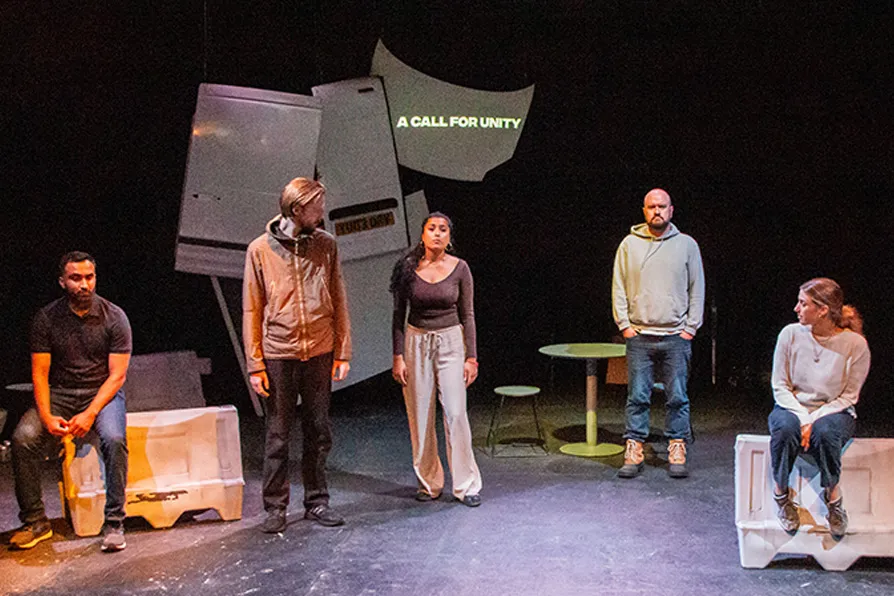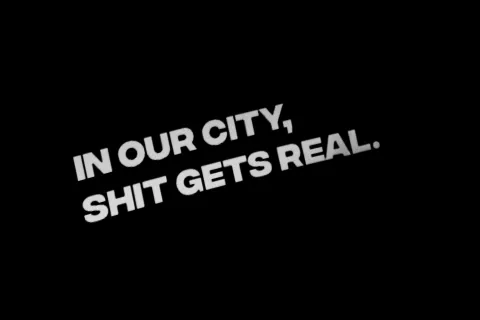The Bard stands with the Reformers of Peterloo, and their shared genius in teaching history with music and song
PAUL FOLEY picks out an excellent example of theatre devised to start conversations about identity, class and belonging

 A CALL FOR UNITY: The cast of What Does It Take To Slay A Dragon [Pic: Elspeth Moore]
A CALL FOR UNITY: The cast of What Does It Take To Slay A Dragon [Pic: Elspeth Moore]
IN a polarised world filled with hate, conflict and cruelty, can there be any such thing as hope? This is one of the many questions playwright Rebekah Harrison poses in her new play What Does It Take To Slay A Dragon? being premiered by Take Back Theatre at 53Two in Manchester. While it’s a play full of questions, it deliberately provides no answers, because it is an urgent plea for us all to join the conversation.
Set in a city — any city — where people try to survive as best they can, Billy is asked to remove an England flag from the dashboard of his van. Not a big issue you would think, but for a man who believes that life just keeps kicking him, refusing to remove the flag is a small act of defiance. But this defiance has consequences which will upend his life.
This is a wonderful, thought-provoking play. It’s not just about some white racist bloke being proud of his country. It is far more complex and nuanced than that. As Harrison herself says: “This is a play about every one of us.” A play about identity, class, belonging, and the lines we draw between ourselves and others. It is about being honest.
It is beautifully directed by Martha Simon with a great freeness and a light touch which allows the work to feel natural and realistic. The ensemble cast, Shaban Dar, Chiara Dev Galli, George Miller, Simon Naylor, James Quinn and Olivia Sweeney are remarkable. They each help create a neighbourhood of troubled, frightened people trying desperately to survive.

The play eschews the simplistic argument that all those working-class communities that voted for Brexit or Reform UK are inherently racist. What it does discuss are the consequences of years of poverty, neglect, disinterest and being marginalised. A level of desperation which is ripe for manipulation by right-wing media and unprincipled politicians.
Speaking briefly to Harrison after the show, it is clear she is passionate about the issues raised in her play. It is important to her that people talk to each other, try to respect each other’s positions, and look at what unites us rather than what divides us.
We are living in very dangerous times. Much of the world has been captured by right and far-right demagogues. Theatre, as with most of the arts, needs to be part of a grand anti-racist anti-fascist mobilisation. Working-class theatre, and especially the Workers’ Theatre Movement, played an important role in the fight against Mosley’s fascist blackshirts in the 1930s. When the National Front tried to take the streets in the 1970s, political theatre fought back with companies like Red Ladder, 7:84 and Monstrous Regiment, taking the anti-racist, anti-fascist message into community centres, pubs and clubs across the country.
Today, as fascism is emerging once more from the murky shadows, actors and creators need to stand shoulder-to-shoulder with trade unions, left political organisations and peace groups to push back against the march towards chaos.
Take Back Theatre is already at the forefront of this fightback, formed by Harrison along with activist and actor Julie Hesmondhalgh and digital artist Grant Archer. As the Manchester Theatre Awards judges noted, Take Back Theatre is bravely and unashamedly political. Their politics are rooted in class solidarity, anti-racism, gender and transgender equality.
And the company goes beyond putting on plays. They have developed an inclusive collective that helps provide support and opportunities to under-represented artists. Based at the 53Two on Watson Street, it’s an exciting artistic hub which, in addition to staging plays, readings and music events, sells the best coffee in Manchester.
It is critical, at a time when opposition voices are being shut down, that companies like Take Back Theatre are supported. Harrison would love to take the play on tour and into schools but it is difficult to get the funding. We can all do our bit to encourage trade unions, community organisers, good local politicians and even some businesses to help.
If we are ever going to get an answer to Rebekah Harrison’s question about hope, then we need to be part of the conversation. Silence is not an option. Things will not change until our voices are heard. And when they are heard, hope will come.
What Does It Take To Slay A Dragon? runs until June 20. Box office: 53two.com.

CARL DEATH introduces a new book which explores how African science fiction is addressing climate change

MIKE QUILLE applauds an excellent example of cultural democracy: making artworks which are a relevant, integral part of working-class lives

BLANE SAVAGE recommends the display of nine previously unseen works by the Glaswegian artist, novelist and playwright

SYLVIA HIKINS casts an eye across the contemporary art brought to a city founded on colonialism and empire










